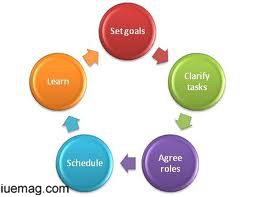

Guru Govind dou khade,
Kaake lagoon pay,
Balihari Guru aapne
Govind diyo batay.
Translates to: If my Guru and God both appear in front of me at the same time, I offer my salutations to the Guru first, because it is the Guru who has shown the path to God. No Guru, No God.
"To be a teacher and help children mold into good citizens of tomorrow is a great responsibility, but there is no feeling equal to knowing that the world is going to witness some great personalities tomorrow, and you are seeing the root and molding it today".
I'm happy to be in the education field, as I get to watch children growing. When I see the students in Grade 10, I feel they have lots to do in life. I wish luck to students writing the board exams and of course to students all over the world with a quote,
"One percent inspiration, 99 percent perspiration gives success."
It is that simple. 'Hard Work Is the Key to Success'. Achieving success is like finding God: the destination is the same but the roads are as varied as the seekers. All you need to do is choose your path.
But what is success?
Success may be described as the realization of an aim, and for the realization of any aim, hard work is essential. Hard work helps us develop our potential to the maximum and strive for excellence in any field. Hard work helps an athlete to persevere in a race and win it, it helps an average student to become extraordinary, it helps to transform destinies.
Success is basically about how you can turn adverse situations in your favor. Life is full of twists and turns. Everyone has to struggle here in this world to overcome every obstacle in the way to success. For this, hard work is necessary. Without working hard and just by sitting idle it will be hard for one to get success. The result of hard work is always fruitful, so YOU have to work hard.
Kaake lagoon pay,
Balihari Guru aapne
Govind diyo batay.
Translates to: If my Guru and God both appear in front of me at the same time, I offer my salutations to the Guru first, because it is the Guru who has shown the path to God. No Guru, No God.
"To be a teacher and help children mold into good citizens of tomorrow is a great responsibility, but there is no feeling equal to knowing that the world is going to witness some great personalities tomorrow, and you are seeing the root and molding it today".
I'm happy to be in the education field, as I get to watch children growing. When I see the students in Grade 10, I feel they have lots to do in life. I wish luck to students writing the board exams and of course to students all over the world with a quote,
"One percent inspiration, 99 percent perspiration gives success."
It is that simple. 'Hard Work Is the Key to Success'. Achieving success is like finding God: the destination is the same but the roads are as varied as the seekers. All you need to do is choose your path.
But what is success?
Success may be described as the realization of an aim, and for the realization of any aim, hard work is essential. Hard work helps us develop our potential to the maximum and strive for excellence in any field. Hard work helps an athlete to persevere in a race and win it, it helps an average student to become extraordinary, it helps to transform destinies.
Success is basically about how you can turn adverse situations in your favor. Life is full of twists and turns. Everyone has to struggle here in this world to overcome every obstacle in the way to success. For this, hard work is necessary. Without working hard and just by sitting idle it will be hard for one to get success. The result of hard work is always fruitful, so YOU have to work hard.

Today's world is a competitive world. Everyone here wants to be famous and wants success in his life.
Whether he may be a successful boxer, sportsman, actor or writer, his present position is only due to hard work.
Luck has nothing to do with it. When we talk about hard work, it is ALL about how well you manage your time.
Goals of Time Management:
To be able to have control over your life - manage your time, don't let it manage you!
To be healthier and happier (and less stressed).
Seven Suggestions for Effectively Managing Your Time
1. Be Organized
Use time saving tools: Appointment calendars, "to do" lists, e-mail, answering machines, file folders, etc. Have an organized workplace (don't waste time constantly looking for things). Use your appointment calendar for everything, including listing study time. Use "to do" lists for both long-term and for each day/week.
2. Plan Ahead (Schedule it and it will happen!)
Determine how long your tasks will take (do this before agreeing to take on a task!) Consider whether any activities can be combined. Determine if big tasks can be broken down into smaller tasks that may be easier to schedule (such as studying for exams and visiting the library as part of an assignment to write a term paper).
3. Prioritize Your Tasks Use an A-B-C rating system for items on your "to do" lists with A items being highest priority. Set goals for both the short term and long term as to what you want to accomplish. Look at all of your "to do's" to gauge the time requirement and whether additional resources will be needed to accomplish them (if yes, schedule time to obtain those resources). Don't postpone the small tasks (a sense of accomplishment is good and overlooked small tasks can become larger tasks.)
4. Avoid Overload:
Include time for rest, relaxation, sleep, eating, exercise, and socializing in your schedule. Take short breaks during study and work periods.
Goals of Time Management:
To be able to have control over your life - manage your time, don't let it manage you!
To be healthier and happier (and less stressed).
Seven Suggestions for Effectively Managing Your Time
1. Be Organized
Use time saving tools: Appointment calendars, "to do" lists, e-mail, answering machines, file folders, etc. Have an organized workplace (don't waste time constantly looking for things). Use your appointment calendar for everything, including listing study time. Use "to do" lists for both long-term and for each day/week.
2. Plan Ahead (Schedule it and it will happen!)
Determine how long your tasks will take (do this before agreeing to take on a task!) Consider whether any activities can be combined. Determine if big tasks can be broken down into smaller tasks that may be easier to schedule (such as studying for exams and visiting the library as part of an assignment to write a term paper).
3. Prioritize Your Tasks Use an A-B-C rating system for items on your "to do" lists with A items being highest priority. Set goals for both the short term and long term as to what you want to accomplish. Look at all of your "to do's" to gauge the time requirement and whether additional resources will be needed to accomplish them (if yes, schedule time to obtain those resources). Don't postpone the small tasks (a sense of accomplishment is good and overlooked small tasks can become larger tasks.)
4. Avoid Overload:
Include time for rest, relaxation, sleep, eating, exercise, and socializing in your schedule. Take short breaks during study and work periods.

Don't put off everything until the last minute (for example,
don't cram for exams). Learn to say "no" when appropriate and to negotiate better deadlines when appropriate.
5. Practice Effective Study Techniques:
Have an appropriate study environment. Split large tasks into more manageable tasks. Read for comprehension, rather than just to get to the end of the chapter. Be prepared to ask questions as they come up during study, rather than waiting until just before an exam. Do the most difficult work first, perhaps breaking it up with some easier tasks. Don't wait until the last minute to complete your projects. Read the syllabus as soon as you get it and note all due dates (and "milestone" times) on your calendar. Be a model student! (be attentive and participative in class, and punctual, prepared, and eager to learn)
6. Be Able to be Flexible:
The unexpected happens (sickness, troubles, etc.), you need to be able to fit it into your schedule.
Know how to rearrange your schedule when necessary (so that it doesn't manage you - you manage it). Know who to ask for help when needed.
7. Have a Vision (Why are you doing all of this?)
Don't forget the "big picture" - why are you doing the task - is it important to your long-term personal goals? Have and follow a personal mission statement (personal and career). (Are your activities ultimately helping you achieve your goals?)
Know what is important to you. (What do you value most?)
8. Last, but not the least, Have a positive attitude!
5. Practice Effective Study Techniques:
Have an appropriate study environment. Split large tasks into more manageable tasks. Read for comprehension, rather than just to get to the end of the chapter. Be prepared to ask questions as they come up during study, rather than waiting until just before an exam. Do the most difficult work first, perhaps breaking it up with some easier tasks. Don't wait until the last minute to complete your projects. Read the syllabus as soon as you get it and note all due dates (and "milestone" times) on your calendar. Be a model student! (be attentive and participative in class, and punctual, prepared, and eager to learn)
6. Be Able to be Flexible:
The unexpected happens (sickness, troubles, etc.), you need to be able to fit it into your schedule.
Know how to rearrange your schedule when necessary (so that it doesn't manage you - you manage it). Know who to ask for help when needed.
7. Have a Vision (Why are you doing all of this?)
Don't forget the "big picture" - why are you doing the task - is it important to your long-term personal goals? Have and follow a personal mission statement (personal and career). (Are your activities ultimately helping you achieve your goals?)
Know what is important to you. (What do you value most?)
8. Last, but not the least, Have a positive attitude!
Copyrights © 2026 Inspiration Unlimited - iU - Online Global Positivity Media
Any facts, figures or references stated here are made by the author & don't reflect the endorsement of iU at all times unless otherwise drafted by official staff at iU. A part [small/large] could be AI generated content at times and it's inevitable today. If you have a feedback particularly with regards to that, feel free to let us know. This article was first published here on March 2012.
Want to Publish About Your Business / Achievements
Let's Discuss Right Away!

All chats are end-to-end encrypted by WhatsApp and won't be shared anywhere [won't be stored either].

